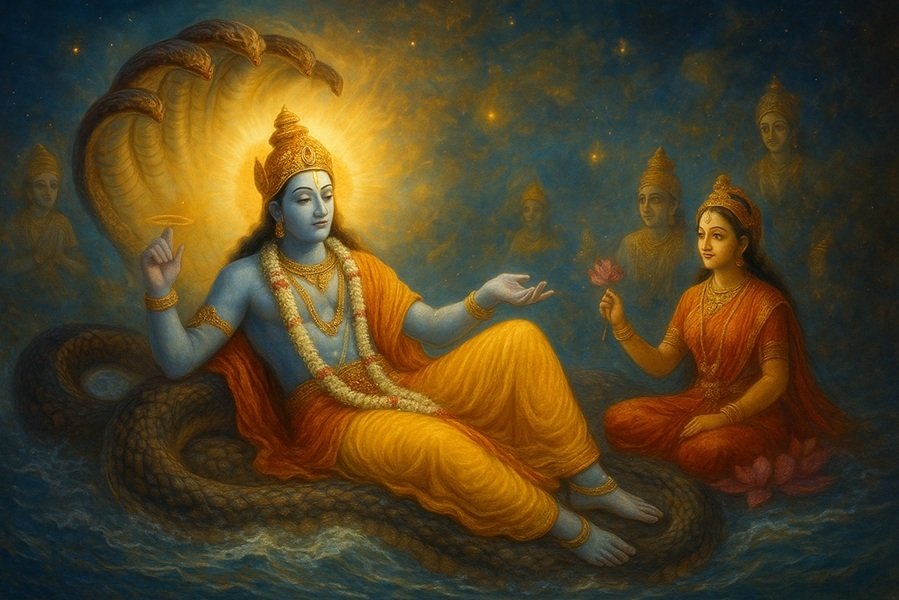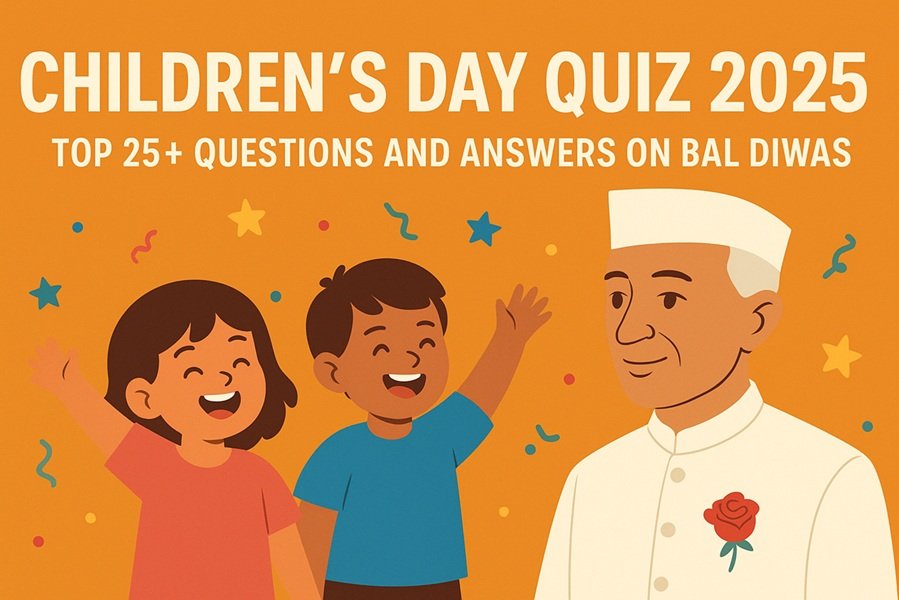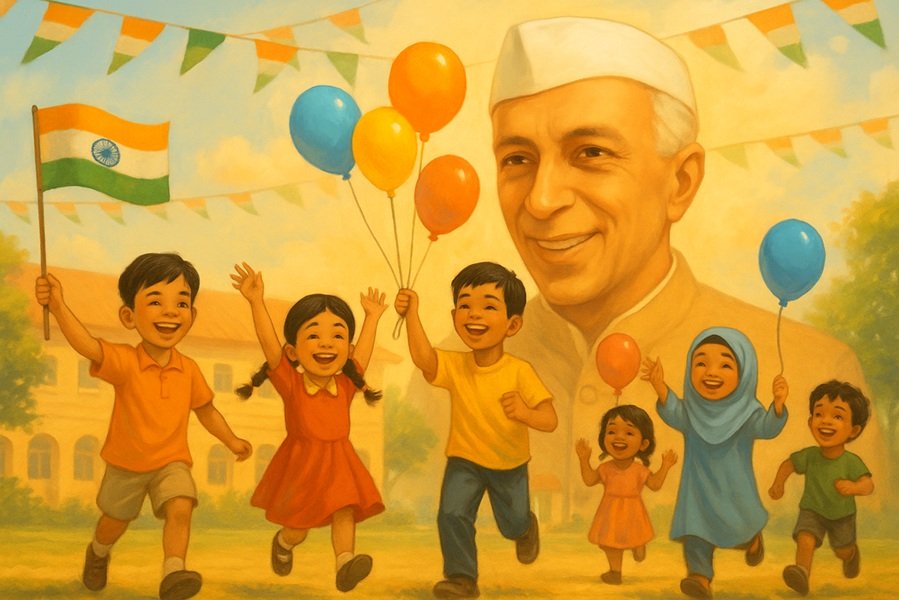
Introduction
Devutthana Ekadashi 2025, also known as Prabodhini Ekadashi, Dev Uthani Ekadashi, Devothan Ekadashi, and Utthana Ekadashi, is one of the most sacred Ekadashis in the Hindu calendar. It marks the end of Chaturmas, the four-month period during which Lord Vishnu is believed to be in deep cosmic slumber (Yoga Nidra). The day signifies Lord Vishnu’s awakening on the Shukla Paksha Ekadashi of Kartik month, which brings back auspiciousness and the start of religious ceremonies, marriages, and festivals.
🗓️ Date: Saturday, November 1, 2025
🌅 Parana (Breaking Fast) Time: November 2, 2025, from 01:11 PM to 03:23 PM
Hari Vasara End Moment: 12:55 PM
Ekadashi Tithi Begins: 09:11 AM on November 1, 2025
Ekadashi Tithi Ends: 07:31 AM on November 2, 2025
Gauna Devutthana Ekadashi: Sunday, November 2, 2025
Parana Time for Gauna Ekadashi: November 3, 2025, from 06:34 AM to 08:46 AM
(Dwadashi ends before sunrise on Parana day)
Devutthana Ekadashi 2025 Date and Timings
| Event | Date | Time |
|---|---|---|
| Devutthana Ekadashi | Saturday, November 1, 2025 | Begins 09:11 AM, Nov 1 – Ends 07:31 AM, Nov 2 |
| Parana Time | Sunday, November 2, 2025 | 01:11 PM to 03:23 PM |
| Hari Vasara Ends | Sunday, November 2, 2025 | 12:55 PM |
| Gauna Ekadashi | Sunday, November 2, 2025 | Parana: Nov 3, 06:34 AM to 08:46 AM |
Note: All these names — Devutthana Ekadashi, Prabodhini Ekadashi, Dev Uthani Ekadashi, and Utthana Ekadashi — refer to the same holy Ekadashi.
Spiritual Significance of Devutthana Ekadashi
According to Hindu scriptures, Lord Vishnu goes into a deep sleep on Devshayani Ekadashi (in the month of Ashadha) and wakes up after four months on Devutthana Ekadashi. This period is known as Chaturmas, a time dedicated to spiritual reflection, fasting, and penance.
When Lord Vishnu awakens, auspicious activities such as marriages, housewarmings, and yajnas resume. Devotees believe that observing fast and worship on this day brings prosperity, peace, and salvation (moksha).
Mythological Story Behind Devutthana Ekadashi
As per Vishnu Purana and Padma Purana, during Chaturmas, Lord Vishnu rests on Sheshnag in the Kshira Sagara (Ocean of Milk). Goddess Lakshmi serves Him during this period. After the four months, when Lord Vishnu awakens on Devutthana Ekadashi, all deities rejoice, and the universe is once again energized with divine vibrations.
It is believed that observing a fast on this Ekadashi helps devotees attain punya (divine merit) equivalent to performing multiple yajnas.
Rituals and Puja Vidhi of Devutthana Ekadashi
- Morning Rituals:
Devotees wake up early, take a holy bath, and observe a day-long fast. Homes are cleaned and decorated with rangoli and diyas. - Tulsi Vivah:
One of the most popular rituals of Devutthana Ekadashi is Tulsi Vivah, the symbolic marriage of Tulsi (Holy Basil) with Lord Vishnu (in the form of Shaligram or Krishna). This ritual marks the beginning of the Hindu wedding season. - Lord Vishnu Puja:
Devotees create an image of Lord Vishnu’s feet (Charan Paduka) on a wooden platform, worship it with flowers, incense, and lamps, and sing bhajans and aarti. - Dev Uthani Ritual (Waking the Lord):
A ritualistic act of waking up Lord Vishnu by tapping a bell or conch shell while reciting mantras:
“Utho Dev Devesha, Jagatpate Jagannatha” — meaning “Awake, O Lord of the Universe.” - Fasting and Parana:
The fast is broken (Parana) the next day after the Hari Vasara period ends, following proper muhurta.
Why Is It Called Prabodhini or Dev Uthani Ekadashi?
The word ‘Prabodhini’ means awakening. Since Lord Vishnu awakens from His cosmic sleep on this day, it is called Prabodhini Ekadashi. Similarly, ‘Devutthana’ or ‘Dev Uthani’ means the awakening of the Lord (Dev), hence both names are synonymous.
Importance of Devutthana Ekadashi Fast
Observing a fast on Devutthana Ekadashi is believed to:
- Remove sins accumulated over lifetimes.
- Bring good health, wealth, and happiness.
- Ensure marital harmony and spiritual progress.
- Help devotees attain liberation (moksha).
Devotees refrain from grains, pulses, and non-vegetarian food, and instead consume fruits, milk, and nuts.
Connection Between Chaturmas and Devutthana Ekadashi
Chaturmas, meaning “four months,” begins with Devshayani Ekadashi and ends with Devutthana Ekadashi. During this period, devotees avoid auspicious functions and focus on meditation, devotion, and self-discipline. With Lord Vishnu’s awakening, all divine and human activities regain momentum.
Regional Celebrations in India
- In Maharashtra and Gujarat: Tulsi Vivah and Devutthana ceremonies are performed with grandeur.
- In North India: Special Vishnu and Lakshmi pujas are organized in temples.
- In Vrindavan and Mathura: The day coincides with major temple celebrations including processions and bhajans.
- In South India: The Ekadashi is observed with fasting, prayers, and recitation of Vishnu Sahasranama.
Conclusion
Devutthana Ekadashi 2025 holds deep spiritual meaning — symbolizing the awakening of divinity, renewal of auspiciousness, and the resumption of dharmic life after a period of rest. Fasting, devotion, and rituals performed on this day are said to bestow immense blessings from Lord Vishnu and pave the way for prosperity and liberation.
As the Lord awakens, devotees too are encouraged to awaken their inner consciousness — to live a life of virtue, service, and faith.



